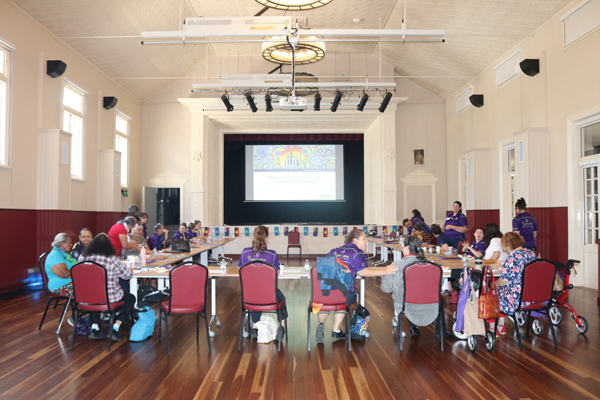Codesigning care for Aboriginal and Torres Strait Islander women, babies and children
 Strong Start to Life is an action of the Metro North Better Together Health Plan 2019-2022. The program works with families to co-design services that improve care models, supporting timely interventions for Aboriginal and Torres Strait Islander women, babies and children that reinforces cultural knowledge and pride.
Strong Start to Life is an action of the Metro North Better Together Health Plan 2019-2022. The program works with families to co-design services that improve care models, supporting timely interventions for Aboriginal and Torres Strait Islander women, babies and children that reinforces cultural knowledge and pride.
Strong Start to Life projects include the Ngarrama model of care enhancements, cultural artwork project and improving community engagement.
Feedback from a participant: “We as Aboriginal women have never had a voice or choice. It’s important for us to help Ngarrama have a voice and we as Elders, are here to help in any way we can.”
Our community partners had ongoing involvement in steering group meetings, face-to-face discussion and participation in collaborative working parties to capture their needs and feedback. Consumers were invited to participate in patient feedback questionnaires and conversations on what they wanted to improve the Ngarrama service. Yarning circles were also introduced for a less formal, more culturally appropriate opportunity to hear their needs and to support connectivity to the service, staff and local Elders. Respected Elders were invited to participate to hear their knowledge, experience, and aspirations on the Ngarrama service and ways we can improve the care we provide.
Building trust with Aboriginal and Torres Strait Islander peoples takes time and needs to be led by and with First Nation staff and leaders. Maintaining these relationships is essential and ensuring these encounters demonstrate reciprocity, mutual respect and a sense of purpose. Engagement is continuous and has multiple modes of interaction- either face-to-face, informally, via electronic modes or structured workshop agendas. The team always make sure there is enough time for meaningful engagement, in safe environments chosen by the participants. Chosen workshop locations are close by, easily accessible and have nourishing food. Conversations were not limited by the agenda.
Ensuring cultural safety in all interactions is paramount. This was achieved by having Aboriginal and Torres Strait Islander peoples leading the engagement, taking ownership of the project outcomes and deliverables to assist in driving change to improve care delivery. Where possible traditional owners were present to give a Welcome to Country.
Face-to-face engagements were undertaken by known staff members in patients’ homes if they wished, within the care setting or away from the hospital environment to support open dialogues free of restrictions.
The project was led by an experienced project officer, trained to manage any escalations or negative feedback that required more investigation. Being aware of any conflicting priorities is also important to create an inclusive space in which all voices are heard, without dominance in any area. Using the framework Stop, Start and Keep is an effective tool to manage different views and opinions and to assist in reframing challenges into opportunities.
The engagement resulted in the Strong Start to Life Artwork project, Allied Health Maternity project. and the Ngarrama enhancement project. All changes to the model of care, service resources, locations of services and cultural safety practices have been designed, developed and implemented with staff, consumers, community and Elders.
Reflections from a clinician involved in a yarning circle, “It was a special day that I felt honoured to be a part of and to be able to listen to Elders and community members share their personal stories, was so touching. These valuable connections cannot be underestimated. Staff were very grateful for the opportunity to connect and apply the insights provided by everyone who attended on the day”.
